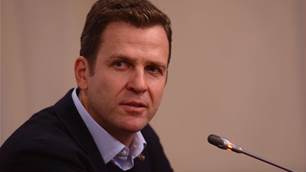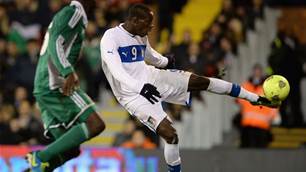The greatest player of his generation, Zinedine Zidane’s career ended in an eruption of violence. One year on, he’s still feeling the aftershocks...
Page 3 of 3 | Single page
“Zidane knows he did a stupid thing”
The head-butt and red card have been debated at length, but it’s interesting a year on to learn how the players saw it all unfold. In fact, most of them didn’t even see the incident. The ball, after all, was nowhere near Zidane when he struck. Lilian Thuram admits: “I told Gennaro Gattuso to stop being a cry-baby”, while Claude Makelele got into a spat with Buffon, accusing the Italians of “being up to their old tricks again”, as he put it. Sagnol told FourFourTwo he first saw the head-butt at 5am the following morning, in his hotel room.
One player who did witness the whole thing was Buffon. “I think I was the only one who saw it,” he says. “The linesman wasn’t looking and the referee was following the ball.” The way Buffon recalls the events brings us back to the row about the role of the fourth official. Did he really see what happened? Or did he benefit from television replays before alerting the referee? Whatever the truth, the correct decision was taken. In France, though, the procedural rights and wrongs were hotly debated and a group of fans brought a court case – subsequently kicked out – to try to get the game replayed.
More fascinating was the reaction to Zidane’s violence. It was, after all, his 14th red card and second World Cup dismissal following his stamp on a Saudi Arabia player in 1998. And yet his status as France’s most popular player since Michel Platini seemed to protect him. Plus the fact he has plenty of influential friends.
The way Didier Deschamps spoke on the post-match TV panel proved indicative of how France would go. Deschamps, a former team-mate at Juventus and captain of France’s 1998 team, said he was sad to see Zidane end his career in such a manner. But he stopped short of overtly criticising him. While in other countries the criticism was stinging, in France people were quickly looking for ways to help Zidane off the hook.
Rumours spread fast. He had been called a terrorist! Materazzi had insulted his mother and sister! Phone-ins were soon flooded with people saying Zidane was right to have stood up for his honour, to have protected his family. When politicians joined in, it became surreal.
Zidane’s team-mates were also keen to absolve him at first. Indeed, it has taken several long months to finally break the omerta. Thuram, as ever, is the most fluent on the subject: “If you say he was right to react like that, then you’re saying that tomorrow morning when some guy says something to you that you don’t like, you can just get out of your car and hit him. That’s anarchy. No, Zidane knows he did a stupid thing.”
Makelele, Zidane’s water-carrier in their Real Madrid heyday, has also come out with his true feelings at last. “I forgive him,” the Chelsea midfielder begins. “But at the same time I don’t forgive him. Because with him still on the field I’m convinced we’d have won the World Cup.”
Cash cows and charity
One place Zidane was certain to avoid criticism was Algeria, a country where he is even more popular than in France. In December, he took his parents back to their homeland, in a plane provided by President Bouteflika. A proud moment for Zidane, who hadn’t been to Algeria for several years and was returning with the specific aim of following up funds he’d helped raise in response to the 2003 earthquake.
Greeted by huge, adoring crowds wherever he went, Zidane nevertheless found himself in a delicate political position. Bouteflika, not one of Amnesty International’s favourite world leaders, awarded Zidane a medal usually reserved for war heroes and posters featuring the two men side by side were slapped up under the slogan ‘Men of Solidarity’. Opposition parties and defenders of the Kabyle cause were outraged.
Zidane’s family is from Kabylie, a region where some campaign for an independent state and most boycott national elections. Therefore, Zidane had to consider his every public word and did so cleverly. He answered questions from Kabyle journalists, and when asked at the beginning of his stay how he felt to be in Algeria his reply was simple: “I’m happy to be in Algeria. And tomorrow I’m going to Kabylie.” It was the perfect win-win response.
In Algeria, Zidane did a spot of business with a telephone company that underlined his enormous earning potential. Marketing experts believe that, unlike most of his former playing partners, Zidane will continue to be in demand years after the end of his sporting career. He is one of those rare athletes whose personality is appreciated over and above performances. And his new ‘partners’ pay well. Who needs to play in Qatar or for the New York Bulls when Danone alone pays a reported $24m over the next 11 years.
This economic might means Zidane can mostly do what he wants for his wife and four boys, with whom he’s decided to stay living in Madrid. But the Zidanes are rarely seen blowing their money, preferring to avoid the limelight. When we do see Zinedine in his spare time, it’s often related to the genuine charity work he does. Involved with ELA, a medical charity, since 1999, Zidane was the main protagonist of a recent prime-time Saturday night show that featured stars performing outside their regular field. After France’s answer to Sandra Sully completed a dance routine, we saw Zidane perform a horse-riding number in the TV studio. Having never ridden, he’d spent three hours every day over a two-and-a-half week period being trained. The programme raised $2.6m for Zidane’s charity.
“I wouldn't have been able to retire...”
Zidane hasn’t limited himself to the small screen. In January, cinema-goers will be able to see him alongside the likes of Alain Delon and Gerard Depardieu in Asterix Goes to the Olympics‚ a film featuring other sports stars such as Beckham and Formula One star Michael Schumacher in similar minor roles. Zidane’s character’s name? “Numerodix” (number 10), of course.
Thankfully for lovers of Zidane’s ball skills, we’ve also seen the maestro in a couple of large-scale charity games, taking on teams captained by his old muckers, Ronaldo and Luis Figo. And he was easily the most skilful on show in February’s futsal exhibition tournament in Paris, where he and the likes of Dugarry and Laurent Blanc proved a match for the best team Paris St Germain could field.
It made you wonder if Zidane might have retired too soon. After all, he was only 34. And the sad thing is Zidane was thinking the same. Couldn’t he return to try to blot out the terrible stain on his career?
“If I hadn’t already announced my retirement, I would have played on for another year,” he confessed in an extraordinarily frank interview recently with Canal Plus. “I wouldn’t have been able to say ‘I’m retiring’ after that. But I’d made the announcement. I had wanted to. And there was no going back.”
When it came to that question again, Zidane looked haggard. And while he still refuses to reveal exactly what Materazzi said, his weary response showed he is aware the head-butt issue will never, ever go away.
“I didn’t choose for it to be this way,” he shrugged. “It happened, and I can’t pretend it wasn’t me. I’m a human being. I reacted. I apologised to everyone, and I would have liked things to end differently. What’s tough is that I have to live with it for the rest of my life.”
The head-butt and red card have been debated at length, but it’s interesting a year on to learn how the players saw it all unfold. In fact, most of them didn’t even see the incident. The ball, after all, was nowhere near Zidane when he struck. Lilian Thuram admits: “I told Gennaro Gattuso to stop being a cry-baby”, while Claude Makelele got into a spat with Buffon, accusing the Italians of “being up to their old tricks again”, as he put it. Sagnol told FourFourTwo he first saw the head-butt at 5am the following morning, in his hotel room.
One player who did witness the whole thing was Buffon. “I think I was the only one who saw it,” he says. “The linesman wasn’t looking and the referee was following the ball.” The way Buffon recalls the events brings us back to the row about the role of the fourth official. Did he really see what happened? Or did he benefit from television replays before alerting the referee? Whatever the truth, the correct decision was taken. In France, though, the procedural rights and wrongs were hotly debated and a group of fans brought a court case – subsequently kicked out – to try to get the game replayed.
More fascinating was the reaction to Zidane’s violence. It was, after all, his 14th red card and second World Cup dismissal following his stamp on a Saudi Arabia player in 1998. And yet his status as France’s most popular player since Michel Platini seemed to protect him. Plus the fact he has plenty of influential friends.
The way Didier Deschamps spoke on the post-match TV panel proved indicative of how France would go. Deschamps, a former team-mate at Juventus and captain of France’s 1998 team, said he was sad to see Zidane end his career in such a manner. But he stopped short of overtly criticising him. While in other countries the criticism was stinging, in France people were quickly looking for ways to help Zidane off the hook.
Rumours spread fast. He had been called a terrorist! Materazzi had insulted his mother and sister! Phone-ins were soon flooded with people saying Zidane was right to have stood up for his honour, to have protected his family. When politicians joined in, it became surreal.
Zidane’s team-mates were also keen to absolve him at first. Indeed, it has taken several long months to finally break the omerta. Thuram, as ever, is the most fluent on the subject: “If you say he was right to react like that, then you’re saying that tomorrow morning when some guy says something to you that you don’t like, you can just get out of your car and hit him. That’s anarchy. No, Zidane knows he did a stupid thing.”
Makelele, Zidane’s water-carrier in their Real Madrid heyday, has also come out with his true feelings at last. “I forgive him,” the Chelsea midfielder begins. “But at the same time I don’t forgive him. Because with him still on the field I’m convinced we’d have won the World Cup.”
Cash cows and charity
One place Zidane was certain to avoid criticism was Algeria, a country where he is even more popular than in France. In December, he took his parents back to their homeland, in a plane provided by President Bouteflika. A proud moment for Zidane, who hadn’t been to Algeria for several years and was returning with the specific aim of following up funds he’d helped raise in response to the 2003 earthquake.
Greeted by huge, adoring crowds wherever he went, Zidane nevertheless found himself in a delicate political position. Bouteflika, not one of Amnesty International’s favourite world leaders, awarded Zidane a medal usually reserved for war heroes and posters featuring the two men side by side were slapped up under the slogan ‘Men of Solidarity’. Opposition parties and defenders of the Kabyle cause were outraged.
Zidane’s family is from Kabylie, a region where some campaign for an independent state and most boycott national elections. Therefore, Zidane had to consider his every public word and did so cleverly. He answered questions from Kabyle journalists, and when asked at the beginning of his stay how he felt to be in Algeria his reply was simple: “I’m happy to be in Algeria. And tomorrow I’m going to Kabylie.” It was the perfect win-win response.
In Algeria, Zidane did a spot of business with a telephone company that underlined his enormous earning potential. Marketing experts believe that, unlike most of his former playing partners, Zidane will continue to be in demand years after the end of his sporting career. He is one of those rare athletes whose personality is appreciated over and above performances. And his new ‘partners’ pay well. Who needs to play in Qatar or for the New York Bulls when Danone alone pays a reported $24m over the next 11 years.
This economic might means Zidane can mostly do what he wants for his wife and four boys, with whom he’s decided to stay living in Madrid. But the Zidanes are rarely seen blowing their money, preferring to avoid the limelight. When we do see Zinedine in his spare time, it’s often related to the genuine charity work he does. Involved with ELA, a medical charity, since 1999, Zidane was the main protagonist of a recent prime-time Saturday night show that featured stars performing outside their regular field. After France’s answer to Sandra Sully completed a dance routine, we saw Zidane perform a horse-riding number in the TV studio. Having never ridden, he’d spent three hours every day over a two-and-a-half week period being trained. The programme raised $2.6m for Zidane’s charity.
“I wouldn't have been able to retire...”
Zidane hasn’t limited himself to the small screen. In January, cinema-goers will be able to see him alongside the likes of Alain Delon and Gerard Depardieu in Asterix Goes to the Olympics‚ a film featuring other sports stars such as Beckham and Formula One star Michael Schumacher in similar minor roles. Zidane’s character’s name? “Numerodix” (number 10), of course.
Thankfully for lovers of Zidane’s ball skills, we’ve also seen the maestro in a couple of large-scale charity games, taking on teams captained by his old muckers, Ronaldo and Luis Figo. And he was easily the most skilful on show in February’s futsal exhibition tournament in Paris, where he and the likes of Dugarry and Laurent Blanc proved a match for the best team Paris St Germain could field.
It made you wonder if Zidane might have retired too soon. After all, he was only 34. And the sad thing is Zidane was thinking the same. Couldn’t he return to try to blot out the terrible stain on his career?
“If I hadn’t already announced my retirement, I would have played on for another year,” he confessed in an extraordinarily frank interview recently with Canal Plus. “I wouldn’t have been able to say ‘I’m retiring’ after that. But I’d made the announcement. I had wanted to. And there was no going back.”
When it came to that question again, Zidane looked haggard. And while he still refuses to reveal exactly what Materazzi said, his weary response showed he is aware the head-butt issue will never, ever go away.
“I didn’t choose for it to be this way,” he shrugged. “It happened, and I can’t pretend it wasn’t me. I’m a human being. I reacted. I apologised to everyone, and I would have liked things to end differently. What’s tough is that I have to live with it for the rest of my life.”
Related Articles

Spain versus Italy to go ahead

Germany preparing for World Cup success













